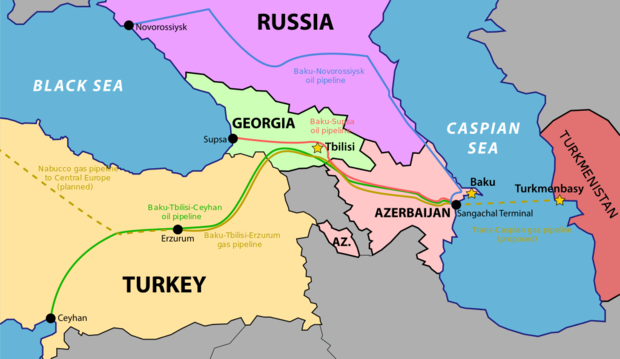The Caspian's uncertain status complicates development of its oil fields
Is the Caspian a sea or a lake? The answer matters not only to geographers but also the Caspian littoral countries because it determines the destiny of the world's largest oil and natural gas reserve. Azerbaijan, Kazakhstan, Turkmenistan, Iran and Russia play a complicated game here.
The Caspian littoral states' working group held its 47th session in Tehran on 23-24 October. These talks have been lasting for decades already, and the recent meeting has brought little results as well. RFE/RL convened a panel including energy and foreign policy experts from Canada, Great Britain and the United States to discuss the matter.
The geographic classification of the Earth's biggest enclosed water body is the main issue. It is still undefined whether it can be classified as a sea or a lake. It makes a big difference because as a lake it should be divided into five equal parts between the littoral countries. That would not suit Azerbaijan and Kazakhstan who actually have bigger territories. In case of declaring the Caspian a sea, each country should get an area according to the length of its coastline. But Iran, whose sector is the deepest, so the production is very difficult, doesn't agree with getting only 13% of the water and seabed. The country posesses the deepest sector, so the production is very difficult.
Technically, none of the countries should be developing oil and gas fields until they come to an agreement on the legal status of the Caspian. However, a lot of production is already running. Baku-Tbilisi-Ceyhan pipeline gets oil from Azerbaijan's Shah Deniz 1 to carry it to Turkey's Mediterranean coast for export. Kazakhstan restarted its production in Kashagan oil field in October after a pause due to an oil leakage. The country also has a number of joint projects with Russia on and near the boundary of the modified median line in the Caspian.

Speaking of the other littoral countries, Azerbaijan and Turkmenistan have been discussing their cooperation plans for around two decades. They consider the construction of an undersea pipeline to bring Turkmen gas across the Caspian for a further pipeline transfer to Turkey and then to Europe. The Trans-Caspian Pipeline is a part of the European Union's Southern Corridor strategy to diversify its gas supply mix in order to overcome the dependence on Russian gas. It is no wonder that Russia is opposing this project referring to environmental concerns. Nevertheless, energy expert Robert Cutler from Carlton University in Ottawa, Canada, says: 'There's so much more experience with constructing and managing these sorts of pipelines in the last 20 years that it really shouldn't be an issue and it is not a technical issue, it is a political issue.' Meanwhile, none of the Caspian states did complain when Kazakhstan's offshore Kashagan field was closed because of pipeline leaks just after the production started in September 2013.
The experts also note the excessive naval presence of Russia in the Caspian. Former deputy director of RFE/RL's Iranian service Hossein Aryan claims that 'Russia has the largest navy, nearly 150 vessels, most of the exercises and drills conducted by Russia in the Caspian Sea are far beyond the agreements reached between the states with regard to maintaining security, fighting smugglers, search and rescue.' This can be a message for the other littoral states about who is ultimately in charge of the Caspian Sea.